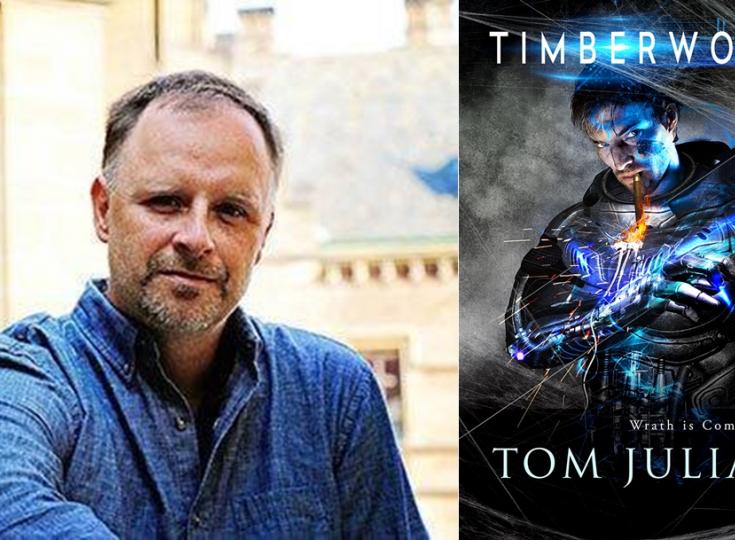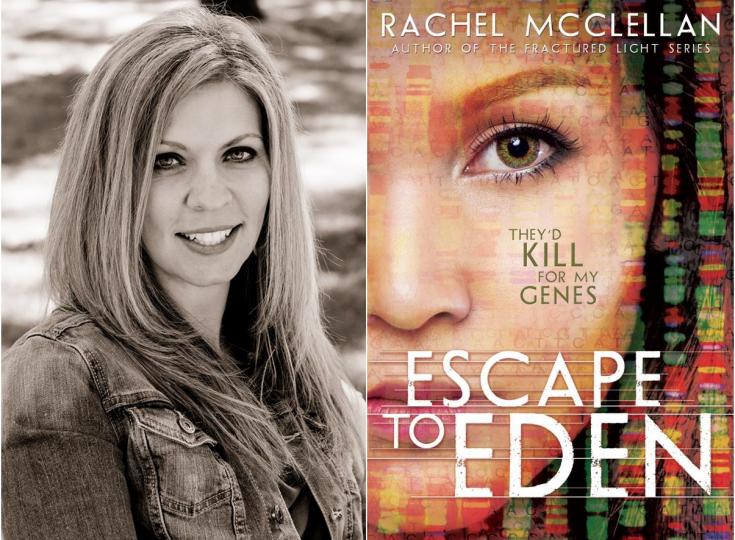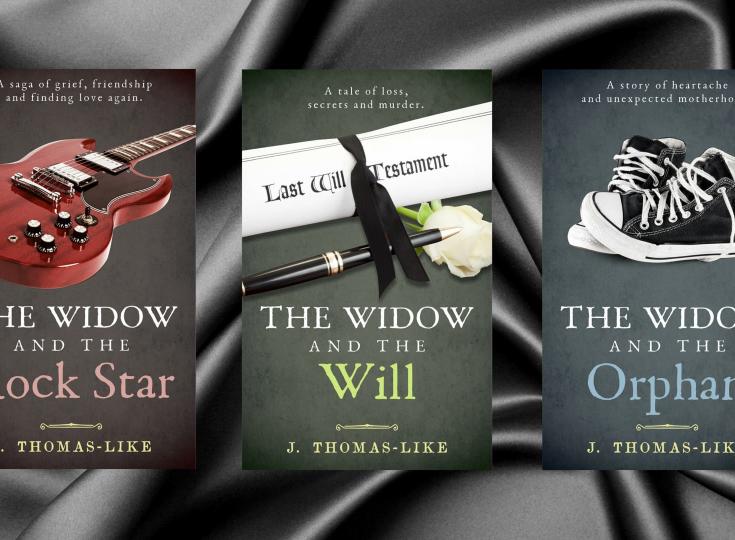Tom Julian - The Best Movie You Will Ever Read

When Tom Julian isn't busy supporting research in to new cancer drugs he likes to watch sci-fi movies play out in his mind and then pen them down, shaping them into epic books. Timberwolf is no exception and Julian hopes that this will be the best movie his readers have ever read! As our Author of the Day, Julian gives us a behind-the-scenes look into what it took to create this book, talks about how his screenwriting background influenced his writing and reveals how he breathes life into his characters.
Please give us a short introduction to what Timberwolf is about.
After a hundred years of waging war against the galaxy, humanity finally is at an uneasy peace after getting nearly destroyed by a race of giant psychic spiders called Arnock. Timberwolf is a special opps soldier (like a Navy Seal) who is now an agent for an organization called the Department of Peace enforcement, which is a sort of CIA type organization empowered to keep the peace by any means necessary. Humanity had gotten rather used to constantly waging war and the urge is strong to go back to our rampaging ways.
During the war, Timberwolf had a very “close encounter” with an Arnock, who now has a psychic connection to him. His mission is to stop his former mentor, the disgraced General Gray, from restarting the war with the Arnock and also keep all his demons at bay. If I was in an elevator pitching it as a movie – I would say it’s Aliens meets Apocalypse Now meets the Wizard of Oz. It’s a very exciting, cinematic adventure that I had initially envisioned as a film.
At its core, Timberwolf is about war and the powers that drive it. I explore the how and why a society might wage constant war and the money, power and theological considerations that might support that. I also worked very hard to make it dramatic. My cardinal rule is… it’s GOT to be thrilling! I fear boring the reader.
What inspired you to write about a damaged super soldier and mind controlling aliens?
OK – here’s some backstory. Did you ever hear of somebody who wrote a spec script for like Star Trek or some other massive fan institution? And then they dreamed that one day the producers might see their work and invite them out to pitch? Well that actually happened to me!
My college project was a teleplay for Deep Space Nine. After I graduated, I shared it with some people and was asked to go out and pitch to Star Trek DS9 and Voyager. We didn’t sell anything, but it was an amazing experience. Back in the hotel room – the idea of a man wrapped in super armor floating in space came to me. That was ALL I had on Timberwolf at the time!
As I outlined it more, his damaged nature came in to focus. I like damaged characters that are not perfect. Damage is interesting because it makes people unpredictable. Timberwolf is kind of selfish and has shifting allegiances – he just wants the damned spider out of his head! And it gets more complicated when he learns more about how that happened in the first place. But at the end of the day he can’t help doing the right thing. It’s in his nature to protect people, but he’s just naturally good at violence.
I love the idea of aliens that don’t look like us, don’t communicate like us and don’t have the same values and beliefs as us. To me, Star Trek and even Star Wars were about interacting with different cultures – even if they had ridges on their heads or were half robot. My vision of aliens is more like dealing with something totally not like us. Contact with aliens is distressing, traumatic and possibly deadly. I really gamed it out - what would a giant spider really be like if it was as smart as we were and could read minds? That helped me shape what the Arnock are about, and I think that makes them better than a pure “evil race” that I could have gone with.
Tell us more about Emmanuel Gray - what makes him tick?
He is an outsider by nature. His backstory is that he’s been denied command due to an injury and has clawed his way to the inner circle. Then when he’s finally ready to fight, he found himself without a war! To struggle for so long in a society that’s pretty much devolved to do one thing… and then have that thing taken away. He’s been aching to prove himself and never got the chance he wanted.
I have a purposeful juxtaposition between the masculine and feminine… you have this male-driven military that’s in-your-face and aggressive, and a more subtle, but equally dangerous, Orwellian-named Department of Peace Enforcement. They use subterfuge and “dirty tricks” to achieve many of the same goals as the military – heck I call the military the Assault Corps, so it’s not subtle! We had been at war for so long, that we needed an agency empowered to slit throats in the middle of the night to keep us at peace. The forces dedicated to making war are just that strong!
Timberwolf is a book that is hard to put down - how did you keep the pace throughout?
Mechanically, I prefer short chapters, and I think that chapters should have a hook, a crescendo and then some sort of resolution or cliff-hangar. Really the same rhythm as full stories. That’s how I outline and I write. I also treat every scene like an action scene.
I don’t mean every scene is a literal action scene, but the conversation and interactions between characters is very kinetic and physical with a definite sense of space. I try to convey what the character is feeling and what the interaction means to them. I want the reader to experience the give and take and the tension.
It’s also about finding the right rhythm. If you have wall to wall action scenes, your reader will be exhausted and things will start to seem pointless. So I balanced the set-pieces, intrigue, plot and world building very consciously. Above all, I worked very hard to make sure things weren’t boring. There’s no filler in the book. The book is short for the vast universe it draws – under 300 pages.
The sci-fi is interesting and believable - how did you pull this off?
I like to think about people as being like they are today, but only thrust into different and futuristic circumstances. In reality, things change and people act differently than they did 200 years ago, but I wanted to keep things accessible. I don’t like sci-fi that feels it has to remove itself from the normal way people behave. That distances the reader unnecessarily. I didn’t want to envision ways of living totally beyond what we have today. It keeps things more relatable and allows the reader to focus on the characters.
Also, I worked very hard to make the technology consistent within its world. Things work the same way for everyone and that makes the setting feel more tangible. Also, I didn’t want anyone to be too sincere – maybe it’s the ironic ex-Brooklyn hipster in me, but I can’t stand one-dimensional characters who more represent ideas, than actual motivations. Sometimes people in my book go along with things they know are horrible ideas, and sometimes they think about just quitting and living their life someplace else. I don’t believe in true believers!
Many people dismiss the genre as pure escapism—and nothing more. What would you say is the purpose of fantasy and sci-fi?
I think the best sci-fi lets you say things you might not feel comfortable saying about the real world. I can talk about war, religion, money, imperialism and politics and no one can pin me down on it because it’s space war, space religion, space money, space imperialism and space politics. Try to watch something like Battlestar Galactica and not feel the mirror it’s holding up to us.
Which actor would you like to see playing as Timberwolf, should this ever get a movie adaptation?
That’s such a great question! I envisioned the book as a movie originally, so I wrote with actors in mind. That’s sort of a cheat I learned from aspiring to write for the screen. If you’re having a hard time with your character, envision them played by an actor. To me, Timberwolf is Oscar Isaac. He can pull off a tough guy, but also has a lot of pathos and the physicality needed.
Is there an underlying message you wish to relay about basic human nature through your characters?
I think it’s that human nature doesn’t change. We’ve leapt to the stars, but still have our prejudices, but now we aim them outward. The belief system that is driving our wars is that we are stamping out other beings that think they are made in god’s image. It’s a xenophobic crusade, and it sounds simplistic, but it makes sense in a blunt instrumentation kind of way.
I think if we met aliens, we’d totally lose our perspective of our place in the universe – even if we met one inch worms swimming under the ice on Europa. If we met aliens who thought (like many of our religions teach) that we are made in god’s image, we’d lose our collective minds.
You write about some heavy themes—things that many of your readers have never experienced—yet it's very easy to identify with your characters. How do you make them so relatable?
I really took care to know my characters first, so I could put them in any situation and make it work. I actually wrote lots of stuff that never saw the light of day, just pages and pages of rambling about what Timberwolf was like growing up. It helped ground my characters and build a world, and when I wanted to apply a big theme to them, I knew what their reactions might be. Also, I feel blessed that I have an ear for dialogue. I really, really try to make the reader experience what is going on through the actions of the characters. A lot of that is through what they say and how they say it.
Have you always known you wanted to be a writer? What inspired your debut?
Well – I really didn’t have a choice. I was born this way! I mentioned before that I fell in love with screenwriting, and that’s like a glorious dream that every writer has – to see their words spoken by an actor on the big screen. Then I realized that books might be better for me. I think and dream BIG and when you’re writing for the screen, you always have to worry about how much something might cost. When you’re writing a book – you can have a thousand alien spiders fighting – like something out of the Lord of the Rings – and you don’t have to worry about paying for it! I love that. I take the gloves off when I write and don’t hold back.
The action scenes are vivid - pulling the reader right into the middle of it all - how did you manage this?
Part of it is the old tricks I learned from screenwriting. It’s an economy of words. Taking an image that’s striking and conveying it in just a few words. That brings a vivid picture to the reader without spending a half a page setting the scene. Then I let the characters experience what’s going on viscerally. I’ll pick the overriding thing I want the reader to feel at the moment and bring that forth. The sharp buzz of a plasma burst stinging someone’s cheek. The pungent smell of a chemical laser, stuff like that. I try to convey things through a variety of the senses. Also, to make it personal for the characters going through it. It’s OK for my characters to be scared, startled, to fumble things. They are humans, even if they’re doing amazing things.
Talk to us a bit about your writing habits. Do you write early in the morning, or through the night? Pen or laptop?
I wrote Timberwolf on the train when I used to commute from New Jersey to New York. That gave me more than an hour each way to work uninterrupted. There was once one guy who yelled at me for typing too loud on my laptop! I yelled back. I’m from New Jersey, so of course I’m yelling back. I was really in to something that day!
Well for me now, I write in the evenings or early in the morning on weekends. We’ve got two younger kids, so a lot of evenings are taken up by homework and getting kids to bed and all that. Weekend mornings are my favorite time to write. I get up early and make myself a cup of French press coffee and I put my feet under a giant Bernese Mount Dog named Maggie May. It’s a nice two hours or so until the rest of the house wakes up! Oh and I never write using paper. I have unintelligible handwriting. I dread having to do things like sign someone’s card at work. It looks like I’m writing with the wrong hand.
What are you working on right now?
I’m working on a lot of sales type activities! Trying to figure out the Amazon keyword puzzle. I am breaking a little better than even though! In other news… I am also working on a sequel to Timberwolf! It literally starts the moment the previous book ends, actually – it starts before the previous book ends if I think about it. I’ve also got a novella that I might put out in October. It’s a sort of a different slice of the Timberwolf universe, a view of the underbelly of organized crime and a travelogue of what exposure to aliens might be like. Hint – it’s really freaky.
Where can our readers discover more of your work or interact with you?
Readers can hassle me here on facebook.com/Timberwolf and here on twitter.com/TimberwolfNovel. It’s a lot of fun to interact with readers and I always welcome it! Even if they didn’t love the book, it’s good to hear that there’s somebody out there.








